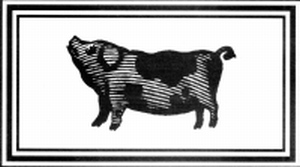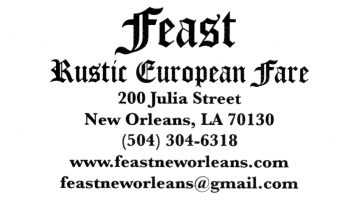Phoebe Dinsmore & the Editor visit a struggling British outpost in New Orleans: Feast.
New Orleans has been called the northernmost Caribbean city; now it is the southernmost outpost of British restaurant food in America. A few years back, Feast opened in Houston to ecstatic national reviews. The chef and owners are ardent acolytes of Fergus Henderson, and based on our own recent visits to the yearling Feast in New Orleans and Henderson’s original St. John in London, the students have surpassed the tutor.

New Orleans can be a tough restaurant town. The city’s moneyed Old Guard tend to eat what they know and tourists tend to look for something, anything, blackened, and for gumbo too. That is not to denigrate New Orleans or its diners, for it can lay convincing claim to the title of best restaurant town in America, and wins the title of best value if tied, just possibly, with Portland, Maine. The high standards and tough competition in both markets inures to the great benefit of diners.
All of this also makes it hard to open a place that offers the unfamiliar, and serious British food is as unfamiliar as it gets to most Americans, so the Feasties understandably fib and call what they cook “rustic European” food. The claim is misleading without lying, unless you really do consider Britain part of Europe, a culturally if not politically dubious proposition.
Feast lies on Julia Street in the arts part of the warehouse district, and indeed it is located in a former warehouse. The room may have been a music club in past incarnations: There is a little stage that now holds a table just inside the door, and a bar runs along the entire back of the house. The restaurant does not feel improvised, however, but rather informal and friendly and serene. The rough columns and beams remain exposed along with brickwork walls, and plain tables and chairs in the manner of St. John, intended not to distract diners from their food, provide the only furnishings beyond the bar.
Service is amateurish and amiable. We had no complaints but fear for their survival on a busy night. During our own midweek visit, Feast was relatively quiet. The clientele, however, was telling; everyone in the place had some connection to the food industry. A vintner held forth for his captive audience at a big table; restaurant owners sampled extra dishes at another, and a single diner announced, shrilly, that he was a food writer for The New Yorker. (We have no way to vouch for the truth of this last assertion.) As an aside, the maitre d’ at Mike’s on St. Charles Avenue, another good spot trying to bring innovation to New Orleans, had nothing but praise for her competition at Feast.
So the word is out within the clan if not upon the street, and Feast ceased regular operations this week. That is a shame, but owners will continue to host catered affairs and stage special events, at least for now. Try to find out what is on at Feast if you find yourself in New Orleans, and by all means visit the original restaurant in Houston, because those in the know will find impeccable ingredients beautifully prepared. Nose to tail starters include silky pork fat to spread on good toast with the kitchen’s own piccalilli. A parsley salad with house cured pork jowl and Cheddar could have come from St. John, except that it is less austere and more interesting than its London counterpart. This is a Gulf city, so shrimp should shine, and they did; a mess of whole ones in the shell fried with garlic butter and fresh herbs was irresistible.
To be fair to the claim that Feast is ‘European,’ there was a starter of ‘Scallops St. Jacque’ on the menu, but the chef adds brandy and mushrooms to the sauce and the combination of cream and shellfish is as British as it is French. The name of the dish is a symptom of the nineteenth century British fondness for French labels as much as anything else; the dish itself is hardly a continental outlier.
Main courses can disappoint after superb starters, but not here. A spectacular whole roast sheepshead special took the big local fish and prepared it in the simplest and best British tradition, and the printed menu was just as good. Fish pie without pastry is a traditional English standby; the version at Feast buried a filling of finfish and scallops under its potato topping crusted with grilled leek and Cheddar. If this sounds heavy it alchemically was not, and the roast Brussels sprouts alongside provided a perfect counterpoint.
Roast pork belly with apples, on the other hand, was heavy indeed, or rather by turns crisp, rich and meaty the way that belly should be, and we literally could not get enough of the potato cake that came with it; we would have liked more from a restaurant that otherwise offers noticeably big portions.
 There was chicken braised with leeks and another ancient British vegetable, fennel; a shepherd’s pie that belied its awful reputation; lamb shank braised with dates; the classic sausages with onion gravy; and a curry for the vegetarians. European maybe; and British to the bone.
There was chicken braised with leeks and another ancient British vegetable, fennel; a shepherd’s pie that belied its awful reputation; lamb shank braised with dates; the classic sausages with onion gravy; and a curry for the vegetarians. European maybe; and British to the bone.
If one dessert typifies the classic Creole kitchen, it must be the bread pudding served in countless iterations all over New Orleans. The city’s chefs do lots of things with the English standby. They add pecans or pralines, dried fruits or drizzles of Bourbon or rum. Commander’s Palace boasts its justly revered bread pudding soufflé. The newcomer at Feast beats them all, as well as anything that the Editor ever has encountered in Britain or anywhere else. It was unfussy rather than Baroque, and burst with flavor.
The wine list is not long. It is, however, both reasonable and quirky, and quirky is good. We ordered a bottle of the ordinarily hard to find Txacolina, the barely bubbly and bright wine of the Basque country. It was ideal with both fish and belly. There is Fuller’s London Pride, if only in bottle, but bottled Pride is good beer.
To top all this off, prices are gentle, especially in comparison to London.
Perhaps we should apologize for the panegyric tone, but find it best to call what we see or, in this case, eat. To steal from Henry Roeland Byrd, if you go to New Orleans, you ought go to the… restaurant called Feast. Just check ahead to see what, if anything, is on.

